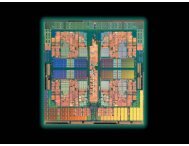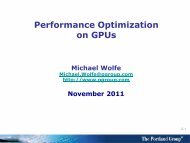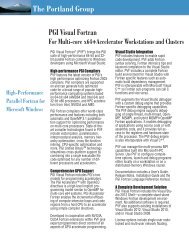PGPROF User's Guide - The Portland Group
PGPROF User's Guide - The Portland Group
PGPROF User's Guide - The Portland Group
You also want an ePaper? Increase the reach of your titles
YUMPU automatically turns print PDFs into web optimized ePapers that Google loves.
Getting Started<br />
‣ It supports multi-threaded programs.<br />
‣ It supports shared objects, DLLs, and dynamic libraries.<br />
To profile your application named myprog, you execute the following commands:<br />
$ pgcollect myprog<br />
$ pgprof -exe myprog<br />
<strong>The</strong> information available to you when you analyze your application's performance can be<br />
significantly enhanced if you compile and link your program using the –Minfo=ccff option.<br />
This option saves information about the compilation of your program, compiler feedback, for use<br />
by <strong>PGPROF</strong>. For more information on compiler feedback, refer to<br />
For a more complete analysis, our command execution might look similar to this:<br />
$ pgfortran -fast -Minfo=ccff -o myprog myprog.90<br />
$ pgcollect myprog<br />
$ pgprof -exe myprog<br />
1.2. Methods of Collecting Performance Data<br />
PGI provides a number of methods for collecting performance data in addition to the basic<br />
pgcollect method described in the previous section. Some of these have advantages or<br />
capabilities not found in the basic pgcollect method. We divide these methods into two<br />
categories: instrumentation-based profiling and sample-based profiling.<br />
1.2.1. Instrumentation-based Profiling<br />
Instrumentation-based profiling is one way to measure time spent executing the functions or<br />
source lines of your program. <strong>The</strong> compiler inserts timer calls at key points in your program and<br />
does the bookkeeping necessary to track the execution time and execution counts for routines and<br />
source lines. This method is available on all platforms on which PGI compilers are supported.<br />
Instrumentation-based profiling:<br />
‣ Provides exact call counts.<br />
‣ Provides exact line/block execution counts.<br />
‣ Reports time attributable to only the code in a routine.<br />
‣ Reports time attributable to the code in a routine and all the routines it called.<br />
This method requires that you recompile and relink your program using one of these compiler<br />
options:<br />
‣ Use -Mprof=func for routine-level profiling.<br />
Routine-level profiling can be useful in identifying which portions of code to analyze with<br />
line-level profiling.<br />
‣ Use -Mprof=lines for source line-level profiling.<br />
<strong>The</strong> overhead of using line-level profiling can be high, so it is more suited for fine-grained<br />
analysis of small pieces of code, rather than for analysis of large, long-running applications.<br />
PGI Profiler User <strong>Guide</strong> 2
















